Talking With Tech AAC Podcast
Technology
Episodes

Tuesday Oct 23, 2018
Tuesday Oct 23, 2018
The TWT team is joined this week by Lindsey Paden Cargill, a speech-language pathologist and AAC specialist who works at Bridgeway Academy in Columbus, Ohio! Lindsey is the creator of the Chatterbox Challenge, an event that seeks to improve the modeling and prompting skills of caregivers and teachers of children who use AAC. During this challenge, caregivers and teachers communicate in a social setting using their student’s AAC device and no oral language!
Before the interview, Rachel and Chris share some modeling “tips and tricks” for AAC communication partners that can be used to improve modeling and prompting. Some of these tips include:
Using an AAC app’s search function instead of visual scanning when looking for a vocabulary word,
Modeling for the student at their language level (or one step above),
Coordinating “core word of the week” at home and in the classroom,
Using peers and siblings as modeling “buddies,” and
Using “scripts” describing how to model a particular book to increase AAC modeling during shared reading time.
Following this discussion, Chris connects with Lindsey Paden Cargill to talk about her work with AAC and the Chatterbox Challenge! First, Lindsey shares about how her efforts to improve modeling among teachers led to the creation of the Chatterbox Challenge, and how parents became motivated to become involved as well. Next, Lindsey and Chris discuss how the Chatterbox Challenge teaches modeling by asking caregivers and teachers to use the devices to communicate. AAC communication partners learn how powerful a robust AAC system can be and how these systems can be used for more than basic requests. Finally, Lindsey discusses some of the rules for the Chatterbox Challenge, and how listeners can start a Chatterbox Challenge of their own!
We want to know what you think! You can connect with us at our Facebook group Talking with Tech, on Twitter, and Instagram (@talkingwithtech)! Also, please subscribe and post a review for us on iTunes- it helps others to find us!
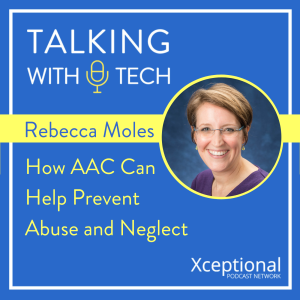
Tuesday Oct 16, 2018
Tuesday Oct 16, 2018
This week, the Talking with Tech team is joined by Dr. Rebecca Moles, a pediatrician who specializes in child abuse, to discuss how we can recognize and prevent the abuse and neglect of people with complex communication needs (CCN). Before the interview, Rachel, Lucas, and Chris connect to talk about some of their experiences with families dealing with abuse and how core vocabulary has been used in some cases to report neglect. The team concludes with a discussion of what we can do to prepare people with CCN to report abuse when it happens, including teaching the word “hurt”, teaching emotion words, and other strategies.
Next, Chris interviews Dr. Rebecca Moles about identifying abuse and neglect, particularly when working people with CCN. Areas covered include: why teaching language is so important to stopping abuse, signs that abuse may be occurring, and what happens (and doesn’t happen) when a report is made to Child Protective Services.
We want to know what you think! You can connect with us at our Facebook group Talking with Tech, on Twitter, and Instagram (@talkingwithtech)! Also, please subscribe and post a review for us on iTunes– it helps others to find us!
Links:
Crime Against Persons with Disabilities, 2009-2014 Statistics (bit.ly/abusestats2014)
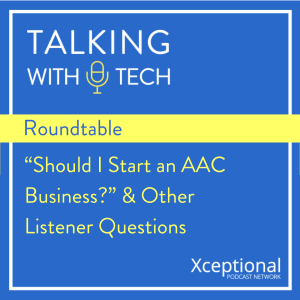
Tuesday Oct 09, 2018
Tuesday Oct 09, 2018
This week, the TWT team answers questions from our listeners! They address the following questions:
I’ve thought about starting an AAC consulting business, but I doubt at times that I have enough experience. What should I do?
What do you think about recent videos from Pyramid/PECS that seem to argue that we shouldn’t introduce core words until a student has already learned a number of fringe words?
How can we best talk to parents about interventions that are not evidence-based, like the rapid prompting method (RPM), when the parent has a positive opinion about it?
This is one of TWT’s most thought-provoking and interesting episodes. You won’t want to miss it!
We want to know what you think! Join us on Facebook at Talking with Tech and on Twitter and Instagram (@talkingwithtech). Also, please subscribe and post a review on iTunes - it helps others to find us!
Links:
PECS & Core Vocabulary 1: http://bit.ly/PECSCoreVocab1
PECS & Core Vocabulary 2: http://bit.ly/PECSCoreVocab2
ASHA Position Statement on RPM: http://bit.ly/ASHARPM
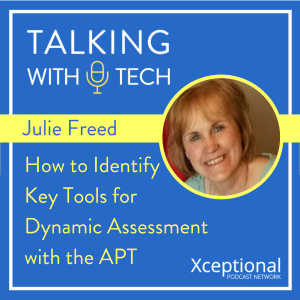
Tuesday Oct 02, 2018
Tuesday Oct 02, 2018
Talking with Tech is joined this week by Julie Freed, an SLP and school-based AAC specialist who helped create the AAC Planning Tool (APT)! Before the interview, Rachel and Chris discuss two communication assessments, the Continuum of Language Expression (COLE) and the Dynamic AAC Goals Grid (DAGG-2). Chris discusses his role in the creation of the COLE, what they considered when making it, and how it can be helpful when assessing emergent communicators. Rachel follows this with a discussion of the DAGG-2 and how it is similar to, and different from, the Communication Matrix. Rachel and Chris also chat about out how these assessments can be used as a baseline to determine the effectiveness of AAC implementation and measure student progress.
Next, Chris interviews Julie Freed, the Assistive Technology/AAC Resource Team Lead at Grant Wood Area Education Agency in Cedar Rapids, Iowa. Julie is the co-creator of the APT, a “menu” of AAC assessment tools that helps to guide the dynamic assessment process. It provides key tools to use as part of this process, including communication sampling forms and communication partner worksheets, that are suggested based on the student’s symbolic communication ability. Julie shares about why the APT was formed, the advantages she has seen from using it, and how it has helped to increase AAC competency and interest for many teachers and staff in her area!
We want to know what you think! Join us on Facebook at Talking with Tech and on Twitter and Instagram (@talkingwithtech). Also, please subscribe and post a review on iTunes - it helps others to find us!
Links:
Continuum of Language Expression (http://bit.ly/colegooglesheets & http://bit.ly/lcpscolepiktochart)
AAC Planning Tool (http://bit.ly/APTbinder)
Dynamic AAC Goals Grid (log into mytobiidynavox.com, then follow this path: Community >> Resources >> AAC Goal Writing)
"Golden Rules of AAC Competency In a New Era of Communication" Course by Lucas, Chris, & Rachel: (http://bit.ly/GoldenRulesofCompetency)

Tuesday Sep 25, 2018
Tuesday Sep 25, 2018
The Talking with Tech team is joined this week by speech-language pathologist and AAC specialist Eleanor Francis to talk about AAC in Australia, literacy, video modeling, and more! Before the interview, Rachel and Chris mark the beginning of the school year with a discussion of Individualized Education Plan (IEP) meetings. Rachel and Chris chat how they maintain a good relationship with the entire IEP team, how to show the team their views are important, and ways to promote collaboration. Rachel and Chris then briefly touch on wording they try to avoid when writing reports (e.g., do we really know what a student was “able” to do, or just what they did?) and the pros and cons of using video to document client progress.
Following this discussion, Chris interviews Eleanor Francis, a speech pathologist who works with students with complex communication needs at a special developmental school in Melbourne, Australia. Eleanor shares about a number of interesting topics, including her tour of the US visiting AAC experts, recent changes to AAC in Australia, lessons learned from the recent ISAAC 2018 conference, and her experiences helping to create a video modeling "TV show" featuring her school’s staff and students called “MeTV”.
We want to know what you think! Join us on Facebook at Talking with Tech and on Twitter and Instagram (@talkingwithtech). Also, please subscribe and post a review on iTunes - it helps others to find us!
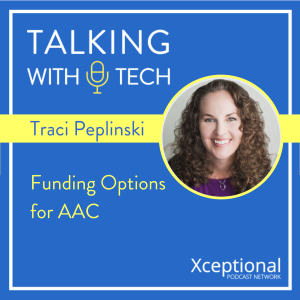
Tuesday Sep 18, 2018
Tuesday Sep 18, 2018
This week, the Talking with Tech team discusses how to obtain funding for alternative and augmentative communication (AAC) devices with speech-language pathologist and nonprofit founder, Traci Peplinski! Before the interview, Lucas, Rachel, and Chris chat about how to find funding for AAC devices and the need for more financial help for individuals who require AAC but cannot pay for it themselves. Then, the team examines why funding for implementation (e.g., training the AAC user’s circle of support) is such an important consideration when evaluating funding needs. The team concludes by touching on some of the challenges they experience with trialing devices during the AAC assessment process.
Following this discussion, Rachel sits down for a conversation with Traci to talk about her nonprofit, A Voice Discovered (www.avoicediscovered.com)! A Voice Discovered provides funding assistance to individuals with complex communication needs in Ventura County, CA. Rachel and Traci discuss why she founded the nonprofit, how it has grown, and how others have used her nonprofit as a model for starting their own! Traci also describes ways that she has helped others find funding assistance, including regional centers, local charities, grants, and donation matching. Finally, Traci discusses her work with The Arc (www.thearc.org) to support adults with complex communication needs, and why helping adults communicate with AAC is so rewarding (and important)!
We want to know what you think! Join us on Facebook at Talking with Tech and on Twitter and Instagram (@talkingwithtech). Also, please subscribe and post a review on iTunes - it helps others to find us!

Tuesday Sep 11, 2018
Tuesday Sep 11, 2018
This week, Talking with Tech is joined by Dr. Jill Senner and Matt Baud! Jill and Matt are AAC experts who promote an evidence-based, systematic method for coaching communication partners how to implement AAC through partner-augmented input (PAI). Before the interview, Rachel and Chris discuss why training and coaching communication partners should be thought of as an ongoing process rather than something that happens once or twice in a “training.” Rachel and Chris also talk about why it is important to try and follow evidence-based principles when coaching communication partners and implementing AAC, even if we may not be able to meet that goal all of the time.
Following this discussion, Rachel and Chris interview Jill and Matt about teaching communication partners to model effectively, how they came to become interested in partner-augmented input, and lessons they have learned coaching communication partners in a systematic way. Their process is based on Kent‐Walsh & McNaughton’s (2005) 8-step process for communication partner instruction, which includes 1) pretest, 2) strategy description, 3) strategy demonstration, 4) SMoRRES (slow rate, model, respect & reflect, repeat, expand, stop), 5) controlled practice & feedback, 6) stepping back, 7) post-testing, and 8) generalization. Jill and Matt explain why generalization can be achieved effectively using this 8-step process, why this process takes less time than you would assume, and strategies for training family members to provide PAI on a consistent basis. Finally, Jill and Matt share some strategies for integrating their 8-step communication partner process into a variety of settings at home and in the community!
Dr. Jill Senner (@JillESenner on Twitter) is a speech-language pathologist, AAC specialist, AAC educator, and owner of the Technology and Language Center! You can find paid and free resources discussing PAI and other topics at her site, talcaac.com!
Matt (@Mbaud12 on Twitter) is an AAC coach, educator, trainer, practice owner, and the AT Coordinator for Niles Township District for Special Education. He is also an adjunct AAC instructor at Saint Xavier University.
We want to know what you think! Join us on Facebook at Talking with Tech and on Twitter and Instagram (@talkingwithtech). Also, please subscribe and post a review on iTunes - it helps others to find us!
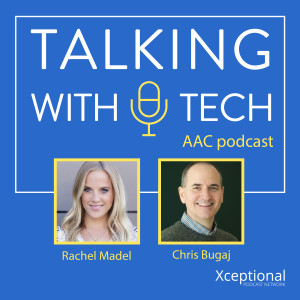
Tuesday Sep 04, 2018
Tuesday Sep 04, 2018
Talking with Tech is joined this week by Speech-Language Pathologist, Author, AAC Specialist, and CEO of Communication Circles, Betsy Furler! Before the interview, Rachel and Chris engage in a discussion of several “back to school” topics, including: the importance of presuming that all of our students are competent enough to communicate, using the excitement of a new school year to promote AAC intervention, what to do when teachers and/or staff are more familiar with one app than another, and the idea of teaching 80% core words and 20% fringe words. Following this discussion, Lucas interviews Betsy Furler about her career as a consultant, advocate, author, business owner, and SLP! Betsy shares why she has focused her career on using technology to improve the lives of others, how she manages such a hectic schedule, and why blocking out “focus time” is so critical to her productivity. Then, Betsy discusses her work to bring technology and people with disabilities together through bridgingapps.org. Finally, Betsy shares practical tips learned about running her own practice (communicationcircles.com); her strategy for hiring and retaining great SLPs; and the why letting go of perfectionism is so important.
We want to know what you think! Join us on Facebook at Talking with Tech and on Twitter and Instagram (@talkingwithtech). Also, please subscribe and post a review on iTunes - it helps others to find us!

Tuesday Aug 28, 2018
Tuesday Aug 28, 2018
Talking with Tech is joined this week by Carrie Baughcum, a special education teacher who teaches language and literacy using a form of drawing called “sketchnoting”! Before the interview, Chris and Rachel discuss how to make drawing a language-rich activity, the benefits of child-directed therapy, and ways they incorporate drawing into their own therapy. Next, Chris is joined by Carrie Baughcum to talk about how she uses sketchnoting to improve visualization and teach language. During sketchnoting, Carrie reads a story (or teaches a lesson) while both she and the students draw several pictures about what they are thinking. In the interview, Carrie shares the story of how she and a friend turned sketchnoting into a classroom activity, and why this approach helps her students understand and remember material better. Carrie and Chris also discuss how to teach core words with sketchnoting, ideas for getting everyone to draw - no matter their skill, and more!
You can connect with Carrie on Twitter (@heckawesome) or at her website (carriebaughcum.com)!
We want to know what you think! Join us on Facebook at Talking with Tech and on Twitter and Instagram (@talkingwithtech). Also, please subscribe and post a review on iTunes - it helps others to find us!

Tuesday Aug 21, 2018
Tuesday Aug 21, 2018
This week, Chris interviews Nicole Wingate and Angie Sheets! Nicole is a Speech-Language Pathologist and Angie is an Intensive Intervention Specialist who created a series of online videos teaching high-frequency, versatile vocabulary words (i.e., core vocabulary). Before the interview, Rachel and Chris discuss topics related to using videos in their own practice, including: the difference between using videos for instruction and as a reward, using short animated films to model core vocabulary, why we should pause and re-watch videos with clients, the benefits of turning captions on, and how to use a client’s photos and videos to teach AAC and language. Following this, Chris sits down with Nicole and Angie. They share the story of deciding to make their own videos after finding few other videos about core vocabulary online. Their project has grown into a series of 30+ videos teaching core vocabulary concepts to students, teachers, and parents in a fun and engaging way. Nicole and Angie share a variety of practical tips about teaching core vocabulary, making videos, and the importance of sharing our own creative projects with others.
Nicole and Angie's YouTube channel can be found by searching "Wings Works" on youtube.com.
We want to know what you think! Join us on Facebook at Talking with Tech and on Twitter and Instagram (@talkingwithtech). Also, please subscribe and post a review on iTunes - it helps others to find us!